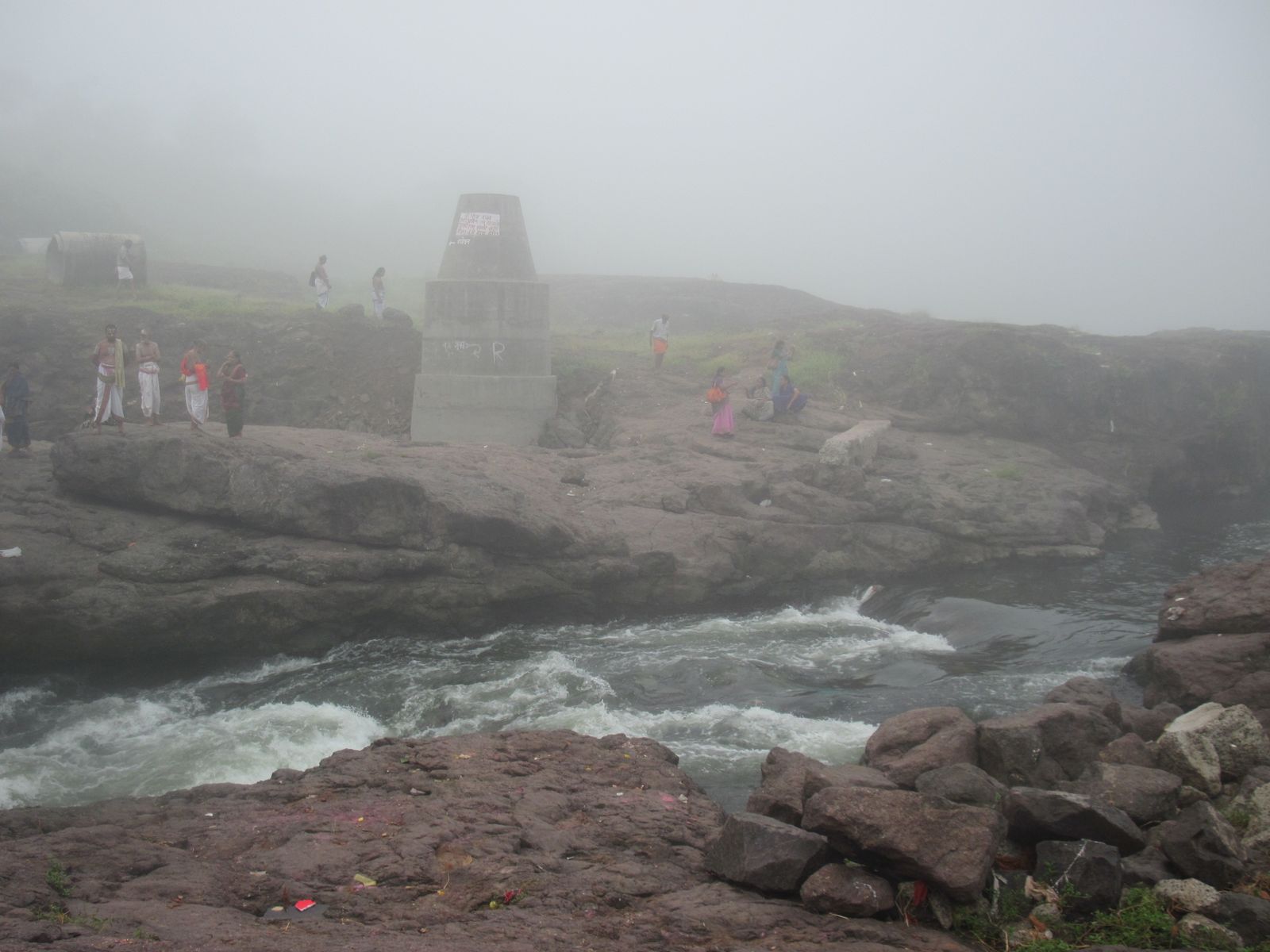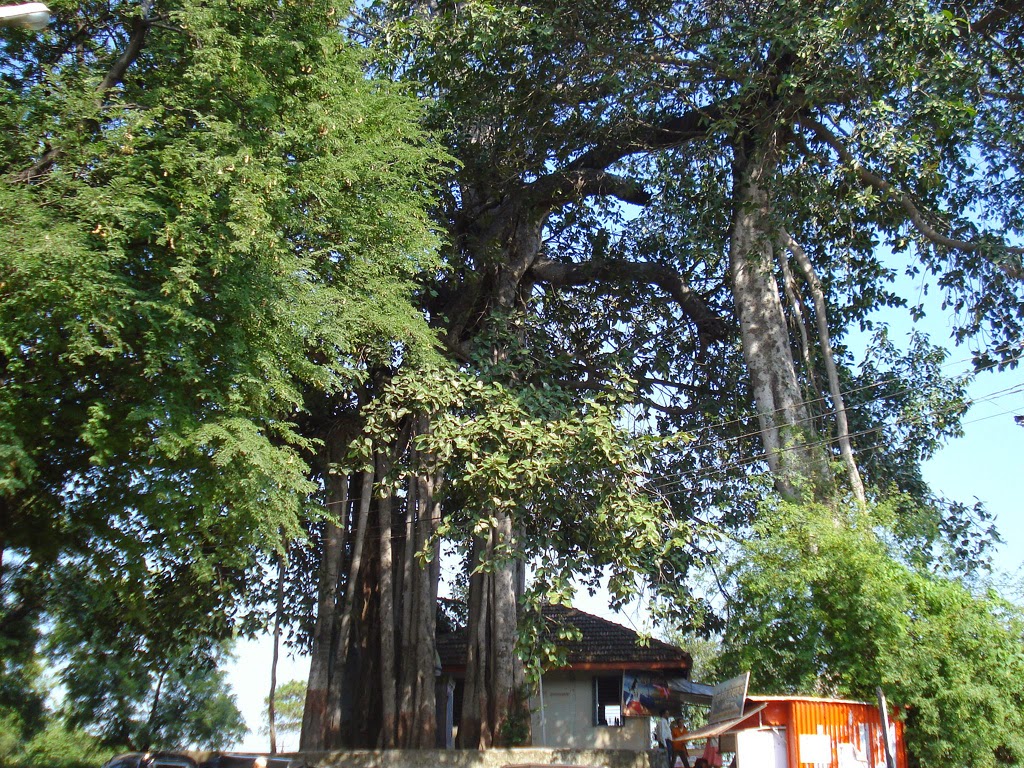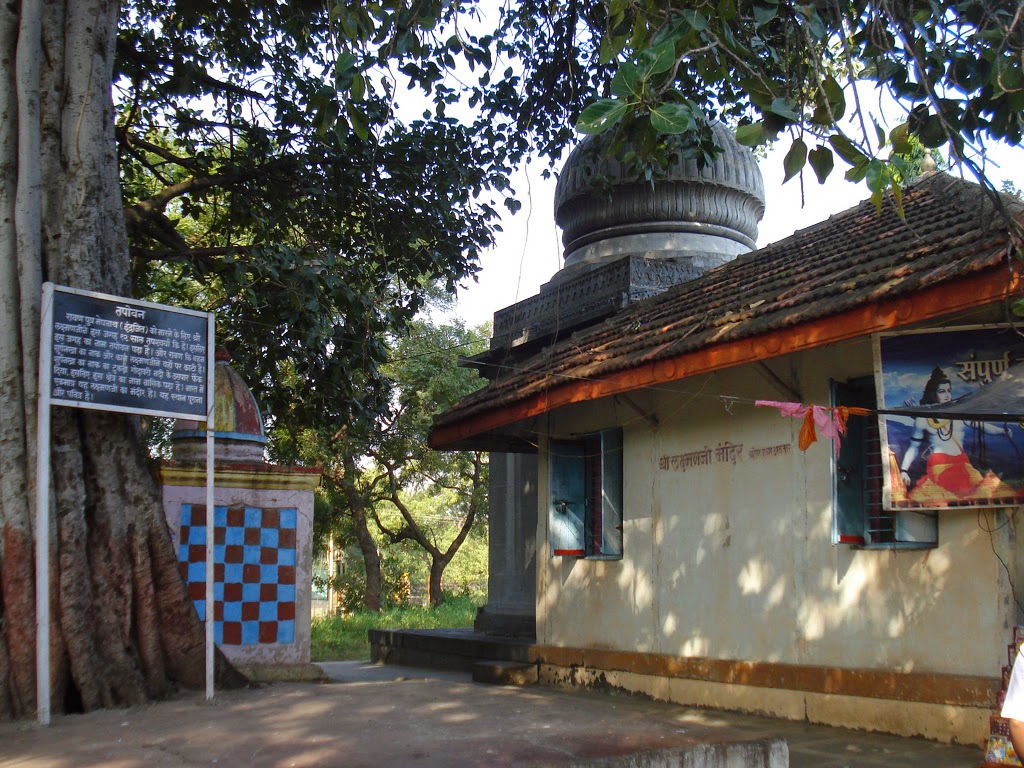tadaa aasiinasya raamasya kathaa samsak ta cetasah
tam desham raakshasii kaacid aajagaama yadricchhhayaa
The greatly abbreviated version of the Ramayana is designed to incorporate the nine principle moods of Indian classical dance: the Nava Rasa. The Ramayana expresses nine rasas (moods or emotions) that we experience in our everyday lives. Sringar (Love) ; Vira (Virtue) ; Karunya (Sorrow) ; Adbhuta (Astonishment or Surprise) ; Hasya (Laughter) ; Bhaya (Fear) ; Bhibatsya (Disgust) ; Raudra (Anger) ; Shanta (Peace). The Hasya (Laughter) section took place in Nasik Tapovan i.e. by chopping off the nose of the demon sister of Ravana, the Ram's brother Lakshman, makes everyone laugh. Truth always overcomes evil.
A few verses from Ramayana of the famous incident of Shoorpanakha meeting Lord Rama in the forest. Valmiki explains the meeting:
sumukham durmukhii raamam vritta madhyam mahodarii ||
vishaalaaksam viruupaaksii sukesham taamra muurdhajaa |
priyaruupam viruupaa saa susvaram bhairava svanaa ||
tarunam daarunaa vriddhaa daksinam vaama bhaasinii |
nyaaya vrittam sudurvrittaa priyam apriya darshanaa ||
shariiraja samaavistaa raaksasii raamam abraviit |
Look at the contrast (Valmiki Comparing Lord Rama with Shurpanakha):
| Shurpanakha | Lord Rama |
| Unpleasant face | Pleasant |
| Pot bellied | Slim waisted |
| Wry eyed | Broad eyed |
| Coppery haired | Neatly dressed |
| Ugly | Charming |
| Brassy voiced | Sweet voice |
| Old | Young |
| Crooked talk | Pleasant talks |
| Ill mannered | Well mannered |
| Clumsy | Refined |
| Abominable | Delightful |
Such a Shurpanakha speaks to Lord Rama about getting married to her!
Once a part of the holy Dandakaranya forest, Tapovan is a pictorial spot and has a close association with the epic Ramayana. Tapovan literally means a place which is reserved for rumination and reparation. Besieged in the richness of lush greenery, Tapovan presents a tranquil ambience This place might be used by great sages for meditation. It is situated at north bank of Godavari River. This place is about 5 KM from central location of Nasik. Lakshmana - brother of Lord Rama, cut the nose and ears of Shurpanakha, the sister of Ravana at this place and therefore the city gets the name Nasik. This sacred place has temples of Ram Parnakuti, Laxmana and Kund. This stunning locale enthrals the tourists mind with Godavari’s noiselessly babbling stream, long stretch of green woods and proximity to jungle’s flora and fauna.
Lord Rama, along with Sita and Laksmana, spent time here during His exile from Ayodhya. Today Nashik is abundant with pilgrims and is attractive because of many beautiful temples, which are a testimony to its rich, eventful history. The name Nashik derives from the word nasika, Sanskrit for "nose." It was here that Laksmana cut off the nose of the demoness Surpanakha, Ravana's younger sister. Triambakeshwar Temple, located in a small village twenty-eight kilometers from Nashik. The temple is dedicated to Lord Siva. (Tri means "three,"ambaka "eye," and isvara"controller.") This marvelous temple made of intricately carved black stone is famous because this is one of the twelve places where Lord Siva is self-manifested in a phallic form (jyotirlinga). He appeared here because he was pleased by the austerities of the sage Gautama. [See the sidebar "The Origin of Triambakeshwar."] The extraordinary feature of this jyotirlinga is that it has three faces: Brahma, Visnu, and Siva.
After seeing the deity of Lord Siva, we walked for about one kilometer and arrived at Kushavarta, a pond built by the sage Gautama. The pond is so named because it was formerly surrounded by kusha grass, used for worship. Today a pillared hall and a few temples surround it. The pond is at the foothills of Brahmagiri Mountain, the source of the Godavari River. On Brahmagiri, pilgrims visit a temple of Ganga Devi (the Ganges), a cave where sage Gautama performed austerities, and Rama-Lakshman Pond, where it is believed that Lord Rama stopped for a few days to performed ceremonies on behalf of his departed father, King Dasaratha.
Tapovan ("forest of penance"), situated on the bank of the Godavari and Kapila rivers some six kilometers south of Ramkund. On the spot where the Kapila meets the Godavari is Kapila Tirtha, where Lord Kapila performed austerities. Under a large banyan tree sits a small shrine where a deity of Lord Laksmana is worshiped. Next to it is a small room containing a sculpture of Laksmana cutting off the nose of Surpanakha. There are 3 kunds, which are known as Brahma tirth, Shiva tirth and Vishnu tirth. They are linked to each other at the bottom by narrow paths. There is another kund known as Agni tirth which he said is very deep.












Surpanakha is a Rakshasi (female demon) of Ramayana, who is the sister of Ravana. The word Surpanakha literally means the lady with sharp nails.
Once Surpanakha saw Rama in the forest of Panchavati and immediately falls in love of him. She desired to have Rama and disguised herself as a beautiful woman by using the power of Maya. Surpanakha in the guise of young human lady appeared before Rama like a full moon. Her slender frame was like a golden creeper and her lovely lips and teeth perfectly matched with her fawn-like eyes. Her gait was that of a peacock and her anklets made music as she proceeded. Surpanakha came near Rama and bowed low to touch his feet. Rama enquired about her origin. Surpanakha replied that she was the daughter of grandson of Brahma and Kubera was her brother. After that Surpanakha praised Rama's masculine beauty and asked him to marry her. Rama said that he is already married and is "Ekapatnivrata" meaning "loyal to one wife only".
Rama asked her to approach his brother Lakshmana. But Lakshmana enjoyed teasing her and said that he was his brother's servant. Hence, it would be better for Surpanakha to be Rama's second wife rather than his first wife. Surpanakha became angry and made abusive remark about Sita. Lakshmana could not control his rage and cut off Surpanakha's nose and ears. In some versions of Ramayana, Lakshman cut Surpanakha's breasts too.
To avenge this insult, Surpanakha returned to the forest accompanied by his two brothers Khara and Dushana. They had a battle with Rama and Lakshman but both Khara and Dushanas were defeated and killed in the war. Surpanakha then returned to Lanka and cried before his brother Ravana and pleaded to take revenge of her great insult.
Shurpanakha spoke these words, tearfully
Tarunau Roopa-sampannau,Sukumaarau Mahabalau,
Pundareeka Vishaalakshau, Cheerakrushna Jinambarau,
Phalamula shinaundantau, Tapasau Brahmacharinau,
Putrau Dashrathasyetyau, Bhratarau Rama Lakshamanau
Shurpanakha went to her brothers with blood oozing since Lakshmana had cut her ears and nose. Instead of scolding Rama she praises Rama in this gattam/stage.
Lava-Kusha Vigraham: Why Lava-Kusha here at Nasik when they were born in Bittoor. Probably at a later stage they would have installed these idols of Sita with Lava-Kusha.
Next, we are moving towards Panchavati, to see KALE Ram, GORE Ram, Sita Gufa, Panchavati in our upcoming articles




0 comments:
Post a Comment